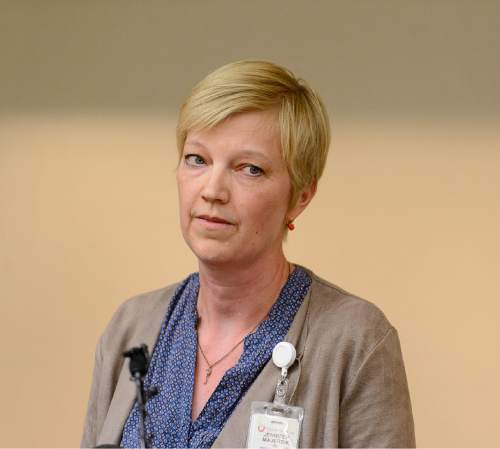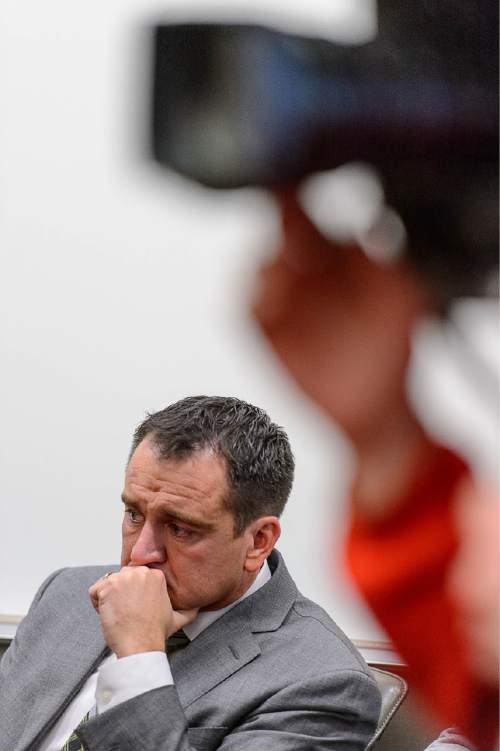This is an archived article that was published on sltrib.com in 2015, and information in the article may be outdated. It is provided only for personal research purposes and may not be reprinted.
The world spun before Becky Lockhart's eyes a few days before Thanksgiving. She chalked up her sudden vertigo to an inner-ear infection.
About seven weeks later, Lockhart could barely speak or swallow and University of Utah neurologist Jennifer Majersik told her she wouldn't live much longer.
At that point, Majersik believes Lockhart could understand that she was dying, but she likely had lost the mental ability to comprehend what was killing her.
That's how fast Creutzfeldt-Jakob disease strikes people in the prime of their lives. Lockhart, 46, died at her home in Provo on Saturday just weeks after her historic legislative career came to a close. She was the first woman to serve as speaker of the Utah House.
There are a few types of this disease, known as CJD for short. Majersik believes Lockhart had the most common form, which strikes with no known cause. Medical professionals have no way to treat it. It hits one out of every 1 million people, and it is always fatal.
"One phrase we use is 'relentless progression.' There is no stopping it," said Majersik, who heads the U.'s Division of Vascular Neurology and sought to educate the public about the disease at a news conference sanctioned by Lockhart's family. "I wouldn't worry about it in the sense that you are going to catch it or develop it because you can't do anything about it. You can't bring this on by stress, travel, good or bad living. Diet won't prevent it. It just is what it is."
CJD is caused by prion proteins forming abnormally and replicating quickly, causing the brain to turn pocketed and spongy. People often are dizzy or confused in the earliest stages and in a matter of months, they can't move or eat or talk. Their brains and their bodies shut down.
Medical experts will conduct an autopsy and examine Lockhart's brain tissue to verify that she had classic CJD, which accounts for 85 percent of all known cases. In about 15 percent of cases, the disease is genetic.
And even rarer is a variant of CJD known as "mad cow disease," obtained by eating tainted meat. No cases of mad cow have originated in the United States. Majersik said, based on body scans and blood and spinal fluid tests, that she's confident Lockhart had classic CJD.
Back in late November and early December, when Lockhart thought she just had a persistent ear infection, she traveled to Arizona and then Washington, D.C., for events with the National Conference of State Legislatures. While in D.C., she met with some of Utah's members of Congress, including Rep. Jason Chaffetz, R-Utah.
Chaffetz went to shake Lockhart's hand, but she waved him off, saying she was a little under the weather.
"She made it sound like perhaps a head cold," Chaffetz said. "Obviously no one knew how severe it was."
From Washington, Lockhart went to New York City. Her close friend, Utah state Sen. Curt Bramble, R-Provo, made the same trip and noticed that Lockhart started getting disoriented as well as dizzy. That's when they knew something was seriously wrong.
Lockhart's family brought her to University Hospital on Jan. 5 and, after a battery of tests, Majersik diagnosed her the next day. With no way to treat the disease, Lockhart eventually returned to her home, where she spent the next 10 days until she died.
As family members sought to learn about the disease, Majersik told them that Utah mandates tracking of each case. The state has recorded five such deaths since 2010. Some states don't track CJD.
"As a nation, we could do a better job having surveillance for this disorder, so we can understand it better. As an example there is not mandatory reporting in every state for this disorder," she said. "We could have national policies. The family and I have talked a lot about those issues."
The family may well take up that cause, but that is a decision for another time, said family spokesman Joe Pyrah.
"The family is grieving, but maybe that is something they will look at down the road," he said. But the family wanted Majersik and Bramble to explain what happened to Lockhart, with the hope that talking about it may make a difference.
"They are hoping it advances knowledge, advances education and maybe advances medical treatments down the road," Pyrah said.
The family has yet to release plans for Lockhart's funeral.











